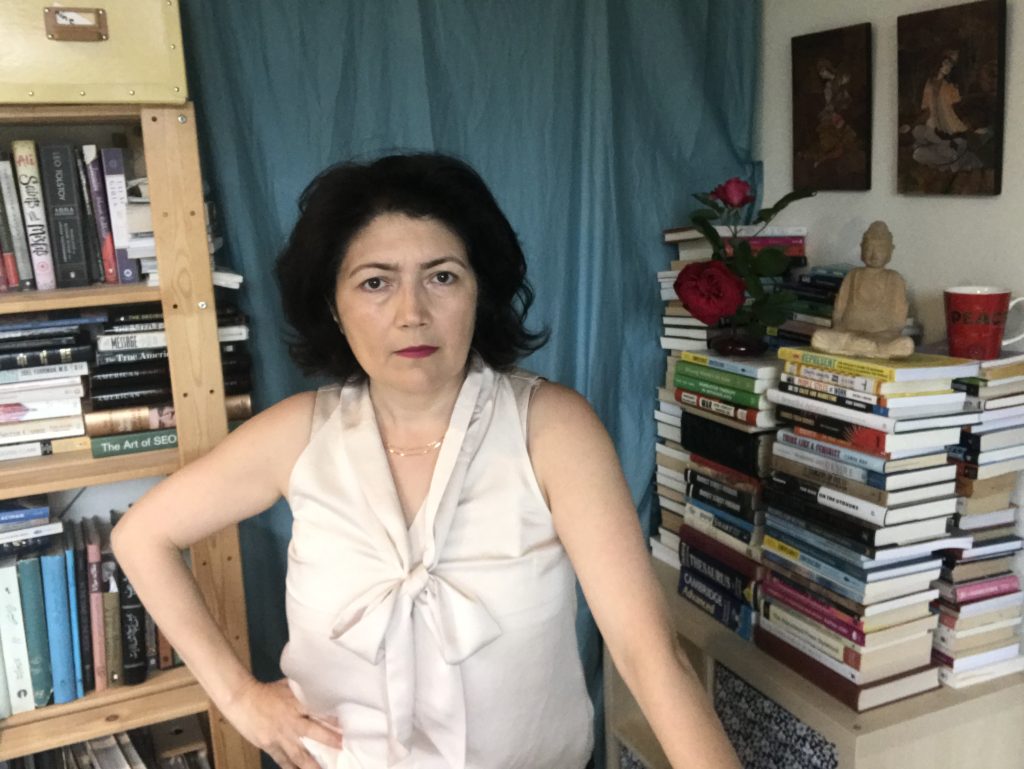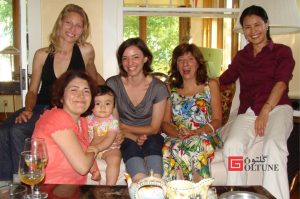
I created Goltune in reaction to my maddening anger. I was exhausted to see how much the media networks I worked for belittled and humiliated the Muslim community in the U.S.. I was mad at my white, American friends in Wisconsin who told me that I was “a different kind of Muslim”. When I asked why, they replied “Because you look normal.” I was also mad at seeing the lack of understanding about Islam at Wisconsin Public Radio while they were producing stories about Islam and Muslims.
Was I really a Muslim though?
But, I didn’t really know I was a Muslim until I came to Wisconsin. I didn’t know my Muslimhood mattered until I sat down at the editorial meeting with Jean Feraca to discuss Muslim women. Everything started with Lisa.
I created Goltune in reaction to my maddening anger of U.S. media poor coverage of Muslim women.
Lisa, my classmate in the Journalism school’s graduate program, invited me to join her, and a group of producers, at Wisconsin Public Radio, to discuss Muslim women. “We have too many Muslim women, in too many countries. What the heck should I know about Muslim women you think,” I said. “No, you ought to come,” she said. “You know more about Muslim women than any of those people in the editorial room.”
Lisa was a slim, clever, recently-divorced Chinese-American student in my Broadcast Journalism class. She managed technical and web-related aspects of Wisconsin Public Radio while attending classes. “Come Wednesday,” she said. “Be there at 12:10. I’ll take you to our editorial meeting with Jean. I want you to talk about your experience,” she said.
WPR Editorial Meeting
On a Wednesday in Autumn 2009, I checked in with the receptionist at the front desk of WPR at 12:08. I stood there for less than 2 minutes. Without giving too much time to the receptionist to look for Lisa, she came out of an adjunct room with a matte glass wall. After a quick handshake, she guided me to the room and showed me a chair at the end of the table to sit on. There were about eight people in that room. I was the ninth.
 I remember a young woman wearing a scarf said something. I was settling down. I couldn’t hear what she was saying. Then, a man in the group asked a question. I heard “Saudi Arabia” in his sentence. An older woman with longer, reddish hair and a deep voice commented about the question that I thought was foolish. The voice of the older woman attracted my attention.
I remember a young woman wearing a scarf said something. I was settling down. I couldn’t hear what she was saying. Then, a man in the group asked a question. I heard “Saudi Arabia” in his sentence. An older woman with longer, reddish hair and a deep voice commented about the question that I thought was foolish. The voice of the older woman attracted my attention.
Can Saudi Women be Poets?
I listened more carefully, and I understood that they were talking about a Saudi woman in Neghab who was winning a poetry contest, and being featured on national TV. “I didn’t know women in Saudi Arabia could appear on TV,” said the older woman with a deep voice.
I was listening to the whole conversation collected and composed until that point. “Why didn’t you?” I asked. Everybody turned in my direction and stared. “I do not believe it would be the right approach to box-in Muslim women. How much do we know about Saudi women and their challenges? How much do we know about the sacrifices they make to be heard? And why do we overlook them?” I said.
“Look, I am from Iran. Back there, I was part of a large group of women who were fighting against the regime and its theocracy. But here, in the US, all we hear is Iranian women’s compulsory hijab. When are we ready to look beyond the hijab, and appreciate women’s forwardness regardless of their appearance” I asked.
“How much do we know about the sacrifices that the Saudi women have to make to be heard?,” I asked.
People in the audience stole a glance from the woman in the room wearing a hijab. “And about the poetry,” I continued. “Poetry has a long-standing history in the Middle East. I started reciting poetry in second grade. The Quran is a form of poetry, just uniquely different. And I don’t think it is fair to say that women in Saudi Arabia cannot be poets just because they cover.”
Later I learned that Jean was a poet herself. She published a poetry book a few years ago. She spent special attention to poets, poetry, and poems.
Jean turned to the woman in hijab, whom I learned later was Reem, and said “But she lives in Saudi Arabia, doesn’t she? Can we invite her to our program? Does she speak English?” she asked, “no,” replied the woman with a hijab. “Ok then, we just cannot feature her. our listeners don’t know Arabic.” she said with a short smile and moved on to a different topic.
At the end of the meeting, Jean invited me to come back next day. They were discussing a matter about Iran.
In our second meeting, I expressed my interest of becoming HOE-RWB intern. They were so short staffed. She was delighted for the suggestion.
To make a long story short
Reem was studying Arabic language for her Ph.D. program while working as a producer for the Inside Islam series at WPR. I was grateful for WPR to produce programs about Islam.
But I was agitated to see how much they miss within their programming. After I graduated from the University, I decided to take things into my own hands.
Please Pledge to Our Peace Journalism.
Goltune is editorially independent. We set our agenda. No one edits our editors. No one steers our opinion. This is important as it enables us to stay true to our values.
Every contribution we receive from readers like you, big or small, goes directly into funding our journalism. Please support Goltune, large or small.
Send your contributions to our PayPal account: [email protected]
Or, Click the link to pledge your support.
Thank you,
Goltune Editorial Team






